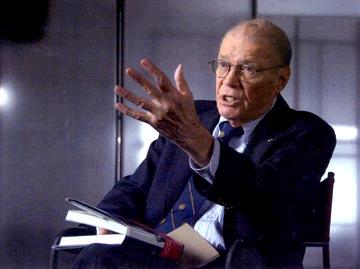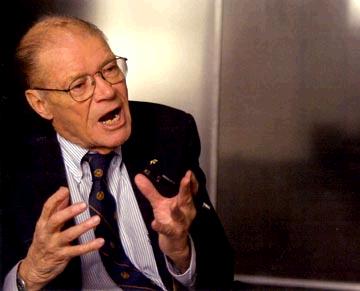The Fog of War
Eleven Lessons from the Life of Robert S. McNamara


It's been a great year, financially and critically for documentaries. Subjects ranged all over the place, with everything from a revolution in Venezuela, migrating birds, temporary art, how a crime affected a family, and heck, even a spelling bee captivated audiences across the nation. Screaming out of the gates as the year finishes is The Fog of War, a remarkable documentary in a year of great ones. Rarely do people have the chance, or take the time to look over their past and talk about their mistakes. Rarer still does somebody like Robert McNamara does this on camera. The Fog of War is an extended confessional, in the form of a series of lessons that McNamara drew from his experiences. Helming this film is Errol Morris (Mr. Death: The Rise and Fall of Fred A. Leuchter, Jr., Fast, Cheap, & Out of Control) and his infamous Interrotron.
The Interrotron is Morris' ingenious device that makes it look like his subject is looking directly at a camera during an interview. Basically, it is a camera with mirrors, so Morris' image is where the lens is, so that his subject, in this case McNamara, will address the camera as if he is addressing Morris. It is simple and elegant, yet lends an impressive amount of weight and adds a personal touch to the proceedings. Morris can also be heard sometimes, prodding his McNamara to expand on his answers. Morris intersperses shots of McNamara in front of the Interrotron with tons of archival footage, and small but effective models. And there is a great score by Philip Glass (The Hours, Naqoyqatsi) that sounds ominous and insistent, yet, by changing a few instruments or the speed, it can become plaintive or even happy. All these things help lead up to the main event; McNamara himself.
McNamara was Secretary of Defense under Presidents Kennedy and Johnson, and one of the driving forces behind US policy in Vietnam. Thus, he was arguably one of the most hated men in America at the time, especially as the War continued and casualties mounted. Whether or not it succeeded is debatable, and even McNamara himself seems to have doubts at times. What is extremely evident is that he is an extremely smart and well-spoken man. McNamara, a Harvard professor, and CEO of Ford (albeit for an extremely short time) seemed like a strange choice for Secretary of Defense. He was very numbers oriented, highly efficient, and only had a few years of combat experience in World War II. McNamara is extremely candid about his actions, good and bad, with the overriding idea that he did what he did to prevent worse. He is a student of ethics, and wonders how much good one must do in order to prevent bad.
Morris organizes The Fog of War with the eleven lessons, which causes McNamara to jump around chronologically. This is actually much more interesting, since it allows the documentary to proceed logically from one step to the next. These various ideas can be as simple as "Maximize efficiency" and "Get the data," to more complex like "Proportionality should be a guideline in war" and "Belief and seeing are both often wrong." Using his life as a template, McNamara runs through these various lessons, showcasing what he and the people around him did right, and more importantly, what went wrong. It takes a strong man to live up to his mistakes, even stronger for a public figure to confess publicly on camera. It is this methodical deconstruction of his actions that makes the film so absorbing. The dichotomy of the image of him on television as Secretary, often arrogant and domineering, contrasts with Morris' interviews, where he is a normal-looking old man. His statements are matter-of-fact, logical, and easy to understand, and add a page or two to the historical record of America. And although he is speaking about events that happened in the past, some of his comments on unilateral government action are extremely relevant in today's political climate.